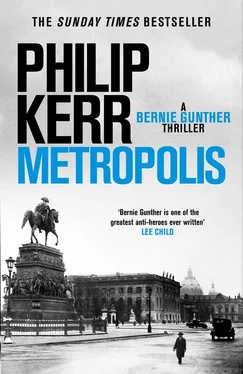But I was hardly listening. My eyes were on the Haller-Revue next door, trying to make out the sound of a saxophone and wondering how much of the music I could hear was being played by Rosa Braun. Clearly I wasn’t going to make it into the Haller that night to see her. If Weiss and Gennat hadn’t been with me, I might have dashed inside and informed the box office that the ticket she’d left for me was no longer required, and that she wasn’t to expect me. As it was, the traffic light changed and we drove off in search of our cadaver, a carful of ghouls with no discernible interest in the living or in scenes of eroticism, startling or otherwise. Nobody said anything now. There’s something about the imminent prospect of viewing a violent death that stops most normal conversation.
The car slowed at Wittenbergplatz, then turned south onto Wormser Strasse where there was a large courtyard surrounded by well-maintained offices and apartments. Guided by a uniformed officer, we drove into the yard and followed a torch to a distant corner. At the top of a steep basement stairwell, we found the lead detective. He was from the Police Praesidium on Sophie-Charlotte-Platz, north of the Ku’damm. His name was Johann Körner, and he was Erich Ludendorff under a false name with slightly less wax on the dead badger he called a moustache — a real old-school Prussian cop with a pickelhaube up his ass. Which is to say he disliked modern, lawyerly cops with new ideas like Bernhard Weiss almost as much as he disliked clever Jews like Bernhard Weiss. They’d crossed swords before but you wouldn’t have known it from the easy way Weiss spoke to him.
‘Commissar Körner, good to see you. It’s my understanding that you have a dead girl here who’s been scalped.’
‘It’s the work of Winnetou, all right. I’ve no doubt about that, sir. Hammer blow to the back of the neck and scalped. She’s lying at the foot of this stairwell. Been dead since the early hours of this morning, I’d say.’
‘This is your case, of course, until you decide differently. But as you know we’ve already investigated two or three similar cases, which gives us a certain insight into the killer’s modus operandi. So we can remain here in a largely advisory capacity; or we can work together with you; or we can take over the case — as you prefer. Really, it’s entirely up to you.’
Körner glanced at his wristwatch as if considering that it was past his own bedtime, brushed his moustache, and then lifted himself up on his toes.
‘Why don’t I just tell you what my men and I have been able to find out and then leave you to it, sir? I’m sure you and your people know much more about this sort of thing than I ever will.’
I wasn’t sure if ‘your people’ meant everyone in the murder wagon or something more insidious, but if Weiss felt insulted, he certainly didn’t show it. As always he was a master of polite restraint and professional courtesy. He could have been speaking to a lawyer in court instead of to an anti-Semitic Pifke like Johann Körner.
‘That’s very generous of you, Johann. Thank you. So tell us what you think you know.’
‘Eva Angerstein, age twenty-seven. Payday prostitute. Worked as a stenographer by day for Siemens-Halske in Siemensstadt. And lived in a room at the far end of the Ku’damm on Heilbronner Strasse, number twenty-four. We found her office clothes in a large cloth handbag we presume must be hers.’
A payday prostitute was a girl who only went on the sledge towards the end of the month, before payday, when money was tight. Common enough in a city like Berlin, where there were always unexpected expenses.
‘The building caretaker found her when he went down these stairs to check the boiler. Rancid fellow named Pietsch. He said there was a problem with half-silks bringing their clients down here from Wittenbergplatz. Up against the wall at the bottom of these stairs looks as good a place for a quick jump as any, I suppose. That’s what we figure must have happened. They went down there together, he hammered her on the neck, and then scalped the poor bitch.’
‘Any witnesses?’
‘None.’
‘Have you spoken to any of the working girls on Wittenbergplatz?’
‘No. There was a receipt in her handbag from the Kakadu club, on Joachimstaler Strasse, from last night, so that’s where we figure she may have met her killer. We haven’t been there either.’
One of Körner’s men handed him a pocketbook, which he handed to Weiss, who handed it to Gennat, who wiped his hands and then handed it to me. I opened it, dropped my torch inside, and noted that it had been bought from Hulbe, a quality leather goods shop on the Ku’damm. I was about to search through the contents when I became aware that the bag was covered in coal dust; it was more or less empty, too, apart from her identification papers.
‘The cloth bag containing her clothes we found in the stairwell next to her body; the handbag we found in the coal bunker up on ground level. One of my men discovered it more or less by chance, just a short while ago.’
‘I wonder why it was in there. Any ideas?’
‘The bag was open, he said. Like someone had been through it, looking for something, and then tossed it.’
‘Apart from the girl’s papers, the bag’s empty,’ I said. ‘No money, no purse, no wallet, no valuables. Nothing.’
‘Not our man’s normal behaviour,’ said Weiss. ‘Not normal at all. Our previous victims were still in possession of some money.’
‘There’s nothing normal about this bastard.’
‘True. I meant, he doesn’t normally rob his victims.’
I could tell that Weiss was thinking the same thing I was: that one of Körner’s men had stolen the money from Eva Angerstein’s handbag and divided it with his commissar. This wasn’t exactly unknown among Berlin cops. Neither of us said a thing.
‘Who knows what’s in the mind of a twisted maniac like Winnetou?’ said Körner. ‘It’s always been my experience that a man like that exhibits all kinds of criminal behaviour. Thieving, arson, rape, you name it. If you told me he was also planning to commit treason I wouldn’t be surprised. It’s not like murderers are scrupulous about breaking the law. In my humble opinion, sir.’
‘Bag’s from Hulbe,’ I said to Weiss. ‘A good bag from a good shop. You wouldn’t expect a girl who could afford a bag like this to take a client and bang him up against a wall in an apartment courtyard. You’d think she would have used a room. Somewhere she could wash.’ I continued searching the bag even as I spoke.
‘You make it sound like she was something better than a whore,’ said Körner. ‘Look, it’s just a handbag, right? I don’t know that it tells you anything. Perhaps her Fritz was in a hurry. Didn’t want all the fancy silk trimmings and lingerie that some of these girls offer. Just a quick bit of mouse and then a bit of cash for a taxi home.’
‘I expect you’re right, Johann,’ said Weiss.
‘This is interesting,’ I said. ‘There’s a secret pocket in this bag. The zip is at the bottom of the pocket instead of the top and underneath a fold of leather so it would be easy enough to miss, I suppose. Certainly anyone in a hurry might not realize it was there. There’s something in it, too.’ My hand came out of the handbag holding a couple of gold rings and a new ten-mark banknote.
‘Let me see that,’ said Körner irritably.
I handed over the rings but not the note.
‘I think you’d better not touch Herr Thaer,’ I said. ‘This one looks brand-new. Like it was issued yesterday. We might even be able to trace this, sir.’
‘Good work, Gunther.’
Ten-reichsmark notes were green and featured an agriculturalist called Albrecht Thaer, whose only real fame was that he was on the money. I’d never heard of him. The heroes of the Weimar Republic always seemed underwhelming, which is perhaps the hallmark of true democracy; under the Kaiser, German money had looked altogether more patriotic and inspiring.
Читать дальше












